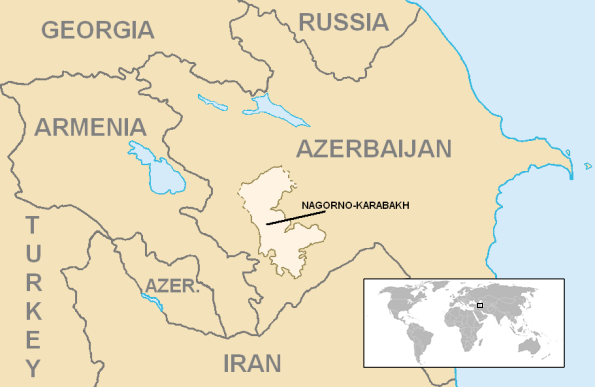
The California-based Center for Truth & Justice (CFTJ) published a report April 18 purporting that acts of genocide have been committed in the contested Nagorno-Karabakh region and Armenian border provinces, and calling upon the International Court of Justice to open an investigation. The CFTJ claims that Azerbaijani security forces have evicted ethnic Armenians from their native lands in these areas since the war of 2020, documenting instances of torture, arbitrary detentions and extrajudicial killings.
The CFTJ report claims that acts by the Azerbaijani armed forces meet both the actus reus and mens rea elements for genocide, prohibited under Article II(c) of the Convention on the Prevention and Punishment of the Crime of Genocide. Under this provision, “genocide” is defined as “deliberately inflicting upon the group conditions of life calculated to bring about its destruction in whole or in part.” (Jurist, CivilNet, AP)
The Armenian government meanwhile continues to make territorial concessions to Azerbaijan. Yerevan announced April 19 that it will return four villages to Azerbaijan as a result of the 8th meeting of the joint Commission on the Delimitation of the State Border. Baku celebrated the return of the villages it said had been “under occupation” by Armenia since the war of the early 1990s. (Jurist, Al Jazeera)
Nonetheless, Armenia’s government decried what it called modern-day “ethnic cleansing” as it commemorated Armenian Genocide Remembrance Day on April 24. “In 2020-2023, we faced new manifestations and consequences of the policy of ethnic cleansing,” the foreign ministry said in a statement. “More than 150,000 Armenians were…forced to leave their historical homeland because of war, xenophobia, crimes based on identity.” (TNA)
Map: Wikipedia





Russian troops withdraw through Lachin Corridorr
A convoy of Russian military trucks entered Armenia from Nagorno-Karabakh on April 22 as Moscow continued to withdraw its peacekeeping troops from the depopulated region occupied by Azerbaijan last September. The 2,000-strong peacekeeping contingent was deployed to Karabakh in line with a Russian-brokered ceasefire agreement that stopped the 2020 war. The Russian troops were due to stay there at least until November 2025. The withdrawing forces entered Armenia through the Lachin Corridor, wich had formerly linked to the contested Karabakh. (Massis Post)
Detained Karabakh leader ends hunger strike
Ruben Vardanian, a former Russian citizen of Armenian descent who served as prime minister in the de facto government of the breakaway region of Nagorno-Karabakh from November 2022 to February 2023, has ended a hunger strike in a Baku prison, his family said on April 25. A family statement said he ended the hunger strike because his health was deteriorating. Vardanian, a billionaire banker who renounced his Russian citizenship, was arrested and brought to Baku after Azerbaijan retook Nagorno-Karabakh in September 2023. He began the hunger strike to demand his release and that of other detained former Karabakh separatist leaders. (RFE/RL)
Protests in Armenia over territorial concessions
Thousands of people protested May 10 in Armenia’s capital Yerevan against the government’s decision to cede territories to Azerbaijan. Armenia agreed to return four villages to Azerbaijan last month in a move that upset many inhabitants of northeast Tavush province. (Jurist)
More protests in Armenia over territorial concessions
Tens of thousands of protestors gathered on May 26 in the heart of Armenia’s capital to demand the resignation of Prime Minister Nikol Pashinyan in response to his government’s decision to surrender control of several border villages to Azerbaijan. The protests were organized by the Movement for Tavush, and led by Bagrat Archbishop Galstanyan, the Armenian Apostolic Church diocese. (Jurist)
More protests in Armenia over territorial concessions
Armenian protestors gathered at Republic Square in the capital Yerevan June 9 to rally against Prime Minister Nikol Pashinyan as part of the “Tavush for the Homeland” movement organized by Archbishop Bagrat Galstanyan. Protestors were blocked by police from marching. (Jurist)
Detained Karabakh leader faces torture: report
The legal team for a former top Nagorno-Karabakh official alleged in a letter addressed to the UN Special Rapporteur on Torture that their client, ex-minister of state Ruben Vardanian, and an unnamed Armenian business leader have been tortured while in custody in Azerbaijan for engaging in a hunger strike. Vardanian was detained in September 2023 after he attempted to cross the border into Armenia through the Lachin corridor after Azerbaijani forces seized the disputed Nagorno-Karabakh. (Jurist)